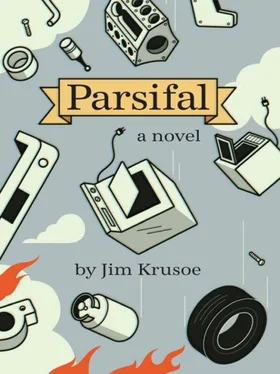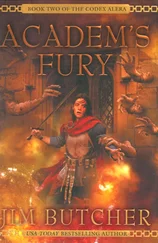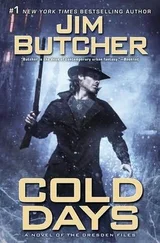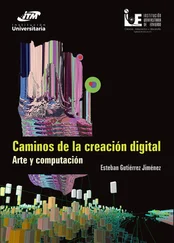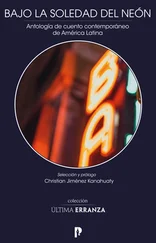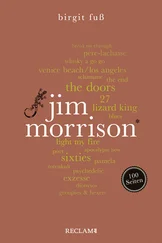Conrad was right, though after a couple of times Parsifal got the hang of it, and afterward, as long as he was in the forest, there was not a day he did not use it either to drink water or to hold his soup. Sometimes he would use it to gather birds’ eggs, and at others to hold unusual stones that he would bring home and offer to Pearl.
Parsifal loved that cup, and he loved its name, Fenjewla , but when he asked his father what it meant, Conrad only smiled and said, “As in the case of your own name, Parsifal, you will learn its meaning soon enough.”
And in fact it was that librarian who first told him about his name.
Also, it’s true that the whole time Parsifal and Pearl were in the forest they were surrounded by bears, but you have to remember that these bears were relatively small and, except for eating his pet squirrel, shy.
One day, while waiting in the library, Parsifal read: There is nothing we can do that does not praise, not even dying .
But praise of what, exactly?
Sometimes he woke in the middle of the night with what his therapist, Joe, described as “a panic attack.”
“Is there anything I can do about it?” Parsifal would ask.
“Not much,” was Joe’s invariable reply.
How Parsifal began to associate the war between the sky and the earth with leaving his former life in the forest, he does not know; he only knows that following Joe’s death the conviction grew in him that if he could just reenter the world of his youth and reclaim Fenjewla, things would stop falling from heaven, the earth would stop burning itself up in fires and volcanoes.
And no one was more aware than he that if he’d discussed his plan with Joe, Joe would have called it an “unhealthy primal regression.”
But by then Joe had already been dead for quite a while.
“Stick out your hands,” Pearl said to him, and he held out his hands. Then his mother took his hands in hers, a finger at a time, holding each one motionless by pressing firmly on its last joint with her left hand as with her right hand she used her steel shears to cut his fingernails. When she had finished, she would sweep the cuttings into a small pile, choose a tree, and together they’d dig a hole at its base, dropping the nail clippings at its bottom.
“In this way,” Parsifal’s mother told him, “the forest will grow to be a part of you and you will be a part of this forest, even after you leave it, as one day you must.”
His mother used these same shears when it came time to cut his hair. First, she ran her hand over his scalp and let his hair crop up between her fingers. Then she cut off anything above that height.
When she cut Parsifal’s nails, she was silent, scarcely breathing, but when she cut his hair, she hummed to herself.
“Stick out your tongue,” Pearl used to say at unexpected moments, “and the bear will bite it off.”
The workbench at Parsifal’s pen repair business always gave him a feeling of calm. It was a complete world in itself, one that contained everything anyone could possibly need to face any problem: pliers, nib pullers, section tools, jeweler’s loupes, a compact grinding machine, polishing cloths, and a shelf with bottles of ink. That night, as Parsifal dismantled the Lady Waterman, he decided that the sac was not the problem; it was firm and resilient. He decided to soak both the feed and the metal nib in ammonia diluted with water; it was a simple trick, but one that solved a variety of problems. Then he went to bed and did not dream at all.
In the morning, Parsifal rinsed the assembly several times with plain water and then replaced the feed and the nib, making sure the nib was centered and not too tight. He drew a little Scrip blue ink into the sac to try it out; it worked beautifully. As a bonus, he smoothed the tip just a little and rubbed polish into a scratch or two along the barrel. The pen looks good , he thought, I wonder if Misty will remark about the difference? He called the number she had given him and left a message on her answering machine.
“Your pen is ready and waiting,” Parsifal told her.
Sand . Parsifal had answered.
One of the first things Parsifal noticed was that the blind men who walked around his block tended to wear light-colored or neutral clothing, avoiding bright reds and greens and blues and yellows. Was it because they did not wish to offend their sighted neighbors with a display of mismatched clothing and so had decided to refrain from using any colors at all? Was it because they did not wish to draw attention to themselves any more than they already had through the constant tapping of their canes? Were they aware how distracting such sounds could be? Sometimes, when unusually large groups of people outside practiced their blindness all at once and walked in circles around his block, it reminded him of rain dripping from leaves in the forest.
On the other hand, he had never heard of an object from the sky falling onto a blind person. So it was possible this ring of the blind around his block protected him as well as them.
It is not uncommon for a ring of mushrooms to appear around a corpse. He read this one day in the library.
Could the bird have been an osprey? Parsifal did not think so. It could have been a white-tailed kite, known for its grace and buoyancy; however, this particular bird did not seem more or less buoyant than any other. It was definitely too high for a harrier, but what about a Cooper’s hawk, or even a northern goshawk, known for its habit of chasing its prey along the forest floor through thickets and amid underbrush? Parsifal doubted it. It could as easily have been a red-shouldered, or even red-tailed, hawk, even a Swainson’s hawk. Could it have been a magnificent condor, a throwback to the Ice Age, whose majestic wings once provided the model for the so-called Thunderbird sketched on the walls of sandstone caverns by Native Americans and since then have become a sort of canary in the mine for the conservation movement? Possibly, though even following their reintroduction into the wild they were still rare, and if it was a condor, then in order to accommodate the effect of distance it would have to be flying a lot higher than this one appeared to be.
Parsifal had researched this question, but came to no conclusion.
Sometimes, in his bed at night, Parsifal lies awake listening to the sounds of objects falling from the sky. Their pitch, varying according to the size and the shape, seems like the music of long-lost voices — parents and their children, perhaps — calling to one another across some unbridgeable distance.
Fenjewla.
Parsifal once knew a librarian who would be intimate only at times when he told her that he had to leave. Until then, she was indifferent, even distracted, busy looking up some reference or other, but the very moment Parsifal mentioned that he had to leave — to drop off or pick up a pen, for example — she leapt to her feet as if she had been given an electric shock. “Wait, you must kiss me first,” she said, and then, before he could say another word, she stepped out of her skirt, which was basically the skirt of a librarian, the kind with ruffles, removed her shoes, which were suited to standing for long periods of time, and unhooked the chain attached to her glasses so she wouldn’t lose them. Then she would lead him into the rare books room, which had a lock, or the book repair annex, which did not.
In a way it was pleasant to know how to control the desires of a serious woman such as this librarian easily, and he often took advantage of his knowledge, but after a while, when he really did have to go somewhere in a hurry, it became awkward.
More importantly, however, Parsifal was embarrassed to be the keeper of a secret so close to the center of this woman. He was embarrassed to see a woman whom he cared for so deeply become such easy prey to manipulation, even if it was his own.
Читать дальше
